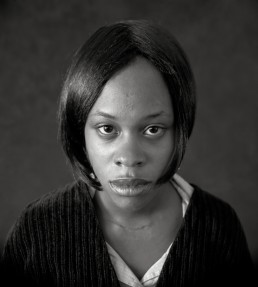Podcast Season 2: Hunger & Resilience
S2: Episode 6 - Joyce

Episode Information
[Intro Music]
Narrator: Welcome to Hunger and Resilience, narrative histories about the complexity and experiences of hunger. A traveling exhibition and weekly podcast edited and hosted by Michael Nye, supported by the San Antonio Food Bank, Eric Cooper, executive director. We are grateful for the honesty and eloquence of every voice. Episode six, Joyce.
Joyce: I grew up in New Orleans, Louisiana, and my childhood was living in poverty half of my life. To me, it was just like living in a home that was not a home, just like a eggshell. No yoke in the inside, just a empty home. And no one would know what was going on in the home. You can’t see past the eggshell unless you crack it. The house I lived in, it had wood floors, but holes in it where the air could come through the floor and soak rats and roaches. We had no water to clean up our home. They had a Chinese restaurant next door and they had a water hose on the side. And that night I would steal the water and use bleach and fill up the toilet just to flush it. They wind up finding out that I was, and I went to them and they was loving. I thought they was going to call the police, but that was good for the restaurant not to smell that smell.
My mom had a gambling problem. It was worse than alcohol with my dad. She wouldn’t stop. There was a time that, I was left alone in the dark and I, it’s kind of funny and it’s kind of sad and it was, wasn’t nothing to eat, wasn’t even much. I don’t believe a chunk of ice frozen in the ice box. I believe the ice box was turned off, wasn’t no electricity or in the water, just was the dry year of the summertime. And I was so hungry and so thirsty. And I went underneath the bed just looking for something like a junkie in a garbage can. And I unwrapped this nice satin gift box and I opened it up and there to my surprise, I see these edible underwear and I’m just thinking my mom is going to kill me. But my stomach told me I have to eat this to survive or I won’t last for her to put her hands on me anyway. And as I ate them, I didn’t even realize that the plastic still was on the underwear ’cause I was so hungry. And the taste just was so fulfilling. And once I was through with it, I realized that I’d done something real bad. And she was very upset that I ate the underwear. She didn’t look beyond the point that there was no food in the house. All she saw was a gift, a underwear. I saw food. I saw a way to survive.
Sometimes I blame myself for being poor because, um, I couldn’t control the situation. And to not have control over your life is being on a death sentence. You’re just sitting there not knowing when they’re gonna call your name and walk you down death row. That’s what your whole family about. Nothing but violence and shame. I believe at that time I met my boyfriend, which is my husband. He placed me in an environment to me that was safe and quiet. It was so good to sleep so well on a bed in peace and quiet, no confusion, no enemies, just two people who love each other. To me, home is what you make of it, not where you are at the time. A a home can travel with you if you carry it in your heart. Also in your mind, not something like real wood or materialistic things. Home may be just you and your husband or you and your kids. That’s what I mean when I say home is where your heart is.
[Outro Music]
Host: This is season two, a weekly podcast, narrative histories about the experience of hunger and resilience and of understanding. I’m Michael Nye. Thank you so much for listening and following this podcast. We are grateful for Joyce’s openness, her eloquence, and presence. May something in her story stay with you. Every person, every place is a map to somewhere else.
